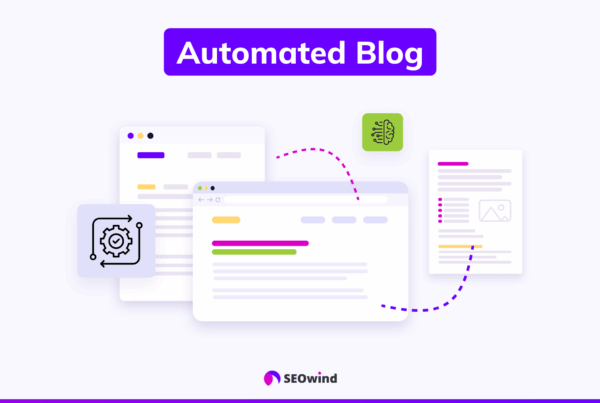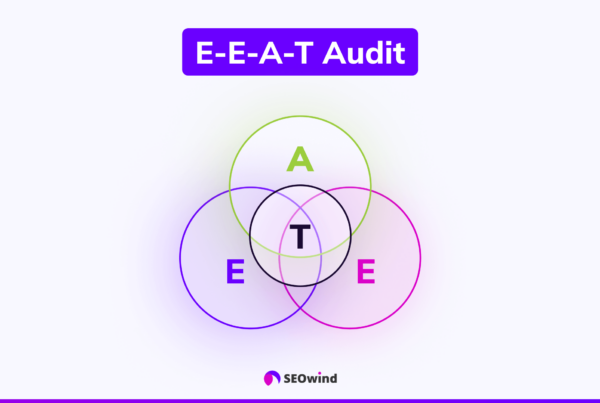Ever found yourself scratching your head, wondering how some websites effortlessly shoot to the top of search results while others seem stuck in obscurity? The answer often boils down to one key ingredient: SEO authority. Countless websites fight for attention and SEO authority is like a magnetic force that attracts search engines and visitors straight to your doorstep. Let’s explore the concept of SEO authority, breaking down its many layers and revealing practical tips to boost your rankings.
What’s going on with SEO Authority?

SEO authority isn’t just another buzzword; it’s a fundamental concept that can make or break your online visibility. But before discussing its impact, let’s explain what SEO authority means and how it’s evolved over time.
The Concept of SEO Authority: Domain, Page, and Link Authority Explained
SEO authority represents the trustworthiness and credibility of a website or webpage in the eyes of search engines. This authority comes in three main flavors: domain authority, page authority, and link authority.
Domain authority refers to the overall strength of an entire website. It’s like the reputation of a brand – the more trusted and established a domain is, the higher its authority. Page authority, on the other hand, focuses on individual web pages. A single page can have high authority even if the overall domain authority is lower, especially if it’s packed with valuable, well-linked content.
Link authority is where things get interesting. This covers the quality and quantity of links pointing to your site or page. Think of these connections as votes of confidence from other websites. The more high-quality sites that link to you, the more authority you gain in the eyes of search engines.
The Evolution of Authority Indicators: From PageRank to E-E-A-T and Beyond
The concept of SEO authority has come a long way since the early days of search engines. Remember PageRank? This was Google’s original algorithm for ranking web pages based on the quantity and quality of links pointing to them. While PageRank is no longer publicly visible, its principles still influence how search engines evaluate authority.
Fast forward to the present, and we’re talking about E-E-A-T: Experience, Expertise, Authoritativeness, and Trustworthiness. This framework was introduced by Google and represents a more nuanced approach to evaluating content quality and website authority. The search engine is no longer purely focused on links; now, you have to demonstrate real expertise and provide value to users.
And the evolution doesn’t stop there. Search engines constantly refine their algorithms to better understand and rank content. They get smarter every day and more able to recognize actual authority by considering factors like user engagement, content freshness, and topical relevance.
As SEO professionals, we’ve had to adapt our strategies accordingly. Gone are the days of link farms and keyword stuffing. Today, building SEO authority requires the creation of genuinely helpful content, fostering relationships within your industry, and consistently demonstrating your expertise.
This shift to a more holistic view of authority has leveled the playing field in many ways. While established giants still have an advantage, smaller sites with niche expertise can now compete by focusing on quality content and building authority in specific areas. It’s an exciting time for SEO in large part because authenticity and value are becoming increasingly important in the quest for higher rankings.
Why SEO Authority Matters for Your Online Presence
In the competitive digital landscape, SEO authority is a must-have for any business looking to make its mark online. The impact of SEO authority on your website’s visibility and success cannot be overstated, and here’s why.
First and foremost, SEO authority directly influences your search engine rankings. High-quality content, backlinks, and search intent continue to be the top 3 ranking factors in 2024 (Source: AIOSEO). This underscores authority’s critical role in determining where your website appears in search results. The higher your SEO authority, the more likely you are to secure those coveted top positions.
But why does ranking matter so much? It comes down to user behavior. The #1 organic result gets 39.8% of all clicks, and moving from position 2 to position 1 generates 74.5% more clicks (Source: FirstPageSage). These statistics highlight the enormous advantage of ranking at the top. When your website has strong SEO authority, your site becomes far more visible while your chances of attracting clicks and, consequently, potential customers improve.
And the importance of first-page rankings becomes even more apparent when you consider that only 0.63% of users click results on Google’s second page (Source: Backlinko). This means that if your website isn’t on the first page, it might as well be invisible to the vast majority of searchers. Building SEO authority is your ticket to breaking through this barrier and getting in front of your target audience.
In addition to rankings and clicks, SEO authority contributes to your brand’s credibility and trustworthiness. When search engines recognize your site as authoritative, it signals to users that your content is reliable and valuable. This can lead to increased trust from your audience, higher engagement rates, and improved conversion rates.
Additionally, strong SEO authority can create a snowball effect for your online presence. As your authority grows, you’re more likely to naturally attract high-quality backlinks, which in turn further boosts your authority. This positive cycle can lead to sustained growth and a more substantial online presence over time.
It’s also worth noting that SEO authority isn’t just about competing with others in your industry. It’s about providing the best possible experience for your users. Focusing on building authority through quality content and valuable resources inherently improves the value offered to your audience. This user-centric approach aligns perfectly with search engines’ goals of delivering the most relevant and helpful results to searchers.
In essence, SEO authority is the backbone of a strong online presence. It influences your visibility, credibility, and ability to connect with your target audience. Prioritizing the development of SEO authority will improve your rankings and lay the foundation for long-term digital success.
How SEOwind Helps Build SEO Authority

Building SEO authority through content creation presents numerous challenges, from conducting thorough research to maintaining consistency in quality. SEOwind addresses these challenges through its Multi-Agent AI System combined with RAG (Retrieval-Augmented Generation), which works similarly to a collaborative marketing team.
Advanced AI-Powered Content Creation System
The system operates through two main components:
Multi-Model AI Integration
- Works with current AI models including Claude 3.5, Gemini 1.5 Pro, Perplexity, and GPT-4
- Each model handles specific tasks based on its strengths
- Combines multiple AI capabilities for comprehensive content development
Multi-Agent Collaboration
The system approaches content creation through distinct roles:
- Data Researcher: Gathers and verifies information
- SEO Specialist: Analyzes search optimization opportunities
- Content Writer: Develops the main content
- Content Editor: Reviews and refines the output
Comprehensive Research and Analysis
The research process focuses on two key areas:
SERP Analysis
- Examines current top-performing content
- Identifies relevant ranking patterns
- Spots opportunities in competitor content
Data Integration
- Incorporates current statistics and trends
- Cross-references information sources
- Includes relevant expert perspectives
E-E-A-T Implementation
The content development process emphasizes:
| Experience | Incorporates practical examples Reflects industry knowledge Includes verified research findings |
| Expertise | Integrates expert insights Provides thorough topic coverage Maintains accuracy in technical details |
| Authoritativeness | References credible sources Includes relevant data points Builds topic authority naturally |
| Trustworthiness | Ensures factual accuracy Maintains transparency Follows content creation best practices |
Content Enhancement Features
The system supports content development through:
Brand Voice Integration
- Adapts to your established tone
- Maintains messaging consistency
- Supports brand identity
Internal Linking
- Identifies linking opportunities
- Helps develop topic clusters
- Strengthens site structure
Quality Assurance
- Provides quality guidelines
- Checks SEO elements
- Assesses readability
- Evaluates content completeness
Content Characteristics
The resulting content typically includes:
- Research-based information
- Relevant statistics and expert insights
- Brand-aligned messaging
- Strategic internal linking
- Search engine optimization

Using SEOwind’s features can help create content that serves both search engines and users effectively. The system’s approach to content creation supports the gradual building of authority in your niche, which can contribute to improved rankings and organic traffic growth over time.
SEO Authority Essentials
To build and maintain SEO authority, you need to focus on several key elements. Let’s review the essentials that will help you establish a foundation for your website’s authority.
Creating High-Quality, Relevant Content That Fulfills Search Intent
As it does in so many other areas, content sits at the heart of SEO authority. But that doesn’t mean you can just churn out articles. A company that wants to achieve authority has to create valuable, informative, and engaging content that serves its audience’s needs. Authority content addresses user queries comprehensively and provides unique insights or solutions.
To create such material, start by understanding your audience’s search intent. What are they looking for when they enter a query? Are they seeking information, looking to make a purchase, or trying to solve a problem? Aligning your content with these intentions improves your odds of satisfying users and search engines alike.
Quality trumps quantity every time. A single piece of well-researched, in-depth content can do more for your SEO authority than dozens of superficial articles. Focus on creating content that:
- Offers unique perspectives or data
- Provides actionable advice or solutions
- Is well-structured and easy to navigate
- Incorporates relevant multimedia elements
- Is regularly updated to stay current
The Power of Backlinks: Earning Quality over Quantity
Backlink authority remains crucial to SEO. However, the focus has shifted from volume to earning high-quality, relevant backlinks. These come from reputable websites in your industry or related fields that vouch for your content’s value.
Understanding the Weight of Different Types of Links
Not all backlinks are created equal. Links from authoritative, trusted websites carry more weight than those from lesser-known or low-quality sources. Similarly, contextual links within relevant content are more valuable than random directory listings or footer links.
Consider the following hierarchy of backlink value:
- Editorial links from high-authority sites
- Guest post links on reputable industry blogs
- Links from industry-specific directories
- Social media mentions from influential accounts
- User-generated content links (e.g., forum posts)
Strategies for Attracting Natural Backlinks
To earn quality backlinks naturally:
- Create linkable assets like original research, infographics, or comprehensive guides
- Engage in industry discussions and contribute valuable insights
- Reach out to influencers or thought leaders in your niche
- Participate in interviews or podcasts related to your expertise
- Leverage broken link building by offering your content as a replacement for dead links
Incorporating Topical Authority to Dominate Niche Segments
Topical authority is becoming increasingly important in SEO. So, you’ll need to understand how to demonstrate comprehensive expertise in a specific subject area rather than just ranking for individual keywords.
Identifying Core Topics and Subtopics
To build topical authority:
- Identify your main area of expertise
- Break it down into core topics and subtopics
- Create a content plan that covers these topics in-depth
- Interlink your content to create a web of information
For example, if you’re in the fitness industry, your core topics might include nutrition, strength training, and cardio, with subtopics like meal planning, weightlifting techniques, and running form.
Curating Content to Build Depth and Breadth in Your Niche
Developing topical authority requires a strategic approach to content creation:
- Create pillar pages that provide a comprehensive overview of core topics
- Develop cluster content that dives deep into specific subtopics
- Regularly update and expand your content to cover emerging trends or questions
- Incorporate expert opinions or collaborations to enhance credibility
- Use internal linking to guide users through your content ecosystem
By focusing on these SEO authority essentials, you’ll have done a great deal to establish a strong and lasting online presence. Always remember that building SEO authority is a marathon, not a sprint. Consistency and patience are key to becoming a recognized expert in your field.
Practical Steps to Enhance Your SEO Authority

Now that we understand the importance of SEO authority, it’s time to cover some practical steps you can take to boost your website’s standing in the eyes of search engines and users.
Evaluating and Tracking Your Site’s Current Authority Status
You need to know where you stand before you can improve your SEO authority. Start by assessing your current domain authority and page authority. While not official Google rankings, these metrics provide valuable insights into how your website might perform in search results.
To evaluate your authority:
- Use tools like Moz’s Domain Authority checker or Ahrefs’ Domain Rating
- Analyze your backlink profile using tools like SEMrush or Majestic
- Review your organic search rankings for key terms
- Check your site’s performance metrics, including page load speed and mobile-friendliness
Keep track of these metrics over time to gauge the effectiveness of your SEO efforts.
Key Tactics for Increasing Domain and Page Authority
Improving your domain authority and page authority requires a multi-faceted approach. Here are some key tactics to focus on:
Enhancing On-page Elements and the User Experience
- Optimize your content for relevant keywords without overstuffing
- Improve your site’s loading speed by compressing images and minimizing code
- Ensure your site is mobile-friendly and responsive
- Use descriptive, keyword-rich titles and meta descriptions
- Implement schema markup to help search engines understand your content better
Leveraging Internal Linking to Distribute Authority
Internal linking is a powerful tactic for boosting page authority that often goes overlooked. By strategically linking your pages, you:
- Distribute link equity throughout your site
- Help search engines discover and index new content
- Improve user navigation and time on-site
When implementing internal links:
- Use descriptive anchor text
- Link from high-authority pages to those you want to boost
- Create a logical hierarchy of links that reflects your site structure
Staying Updated: The Role of Content Freshness in Sustaining Authority
Search engines favor websites that consistently provide fresh, updated content. To maintain and improve your SEO authority:
- Regularly audit and update your existing content
- Add new, relevant information to your cornerstone pages
- Create a content calendar to ensure consistent publishing
- Monitor industry trends and update your content accordingly
- Encourage user-generated content, such as comments or reviews, to keep pages active
Improving your domain and page authority requires patience, consistency, and a commitment to providing value to your audience. By focusing on these practical steps and continuously refining your approach, you will eventually see your website become more visible in search results.
Measuring the Impact of Increased SEO Authority

As you work on improving your SEO authority, make sure to measure the impact of your efforts. This helps you understand what’s working and guides future strategies. Let’s explore how to assess changes in your SEO authority and look at some success stories.
Tools and Metrics for Assessing Domain and Page Authority Changes
Tracking your domain authority score and page authority SEO metrics is essential for understanding your progress. Here are some tools and metrics you can use:
- Moz Domain Authority (DA) and Page Authority (PA): These metrics predict how well a website or specific page will rank on search engine result pages (SERPs).
- Ahrefs Domain Rating (DR) and URL Rating (UR): Similar to Moz’s metrics, these provide insights into the strength of your backlink profile.
- SEMrush Authority Score: This tool combines many factors to give an overall authority rating.
- Google Search Console: Although it does not provide a direct authority score, it offers valuable data on your site’s search performance.
- Keyword Rankings: Monitor your rankings for target keywords. Improved authority often correlates with better rankings.
- Organic Traffic: An increase in organic traffic can indicate growing authority.
- Backlink Profile: Track the quantity and quality of backlinks acquired by your site.
When using these tools, pay attention to trends over time rather than fixating on day-to-day fluctuations. It’s also important to note that while these metrics are helpful, they’re not official Google rankings.
Future Trends in SEO Authority
As the digital landscape continues to evolve, so does the concept of SEO authority. Staying ahead of the curve is crucial for maintaining and improving your website’s visibility. Let’s explore the future trends in SEO authority and how you can prepare for them.
Anticipating Changes in How Search Engines Evaluate Authority
Search engines are becoming increasingly sophisticated in how they assess SEO authority. Here are some trends we expect to see:
- AI and Machine Learning: Search engines will likely use more advanced AI to understand content context and user intent, potentially redefining what constitutes authority.
- User Behavior Signals: Engagement metrics like time on site, bounce rate, and click-through rates may play a more prominent role in determining authority.
- Entity-Based Search: Search engines will likely shift to understanding entities (people, places, things) and their relationships rather than just keywords.
- Voice Search Optimization: As voice search grows, the ability to provide concise, authoritative answers should become more important.
- Mobile-First Indexing: With mobile usage dominating, mobile performance will likely become an even more critical factor for assessing authority.
Best Practices for a Future-Proof SEO Authority Strategy
To build and maintain SEO authority in the face of these changes, consider the following best practices:
Adapt to Algorithm Updates with a Focus on Quality and Relevance
- Prioritize User Experience: Ensure your site is fast, mobile-friendly, and easy to navigate.
- Create Comprehensive Content: Develop in-depth, authoritative content that covers topics thoroughly.
- Focus on E-E-A-T: Demonstrate Experience, Expertise, Authoritativeness, and Trustworthiness in your content.
- Optimize for Semantic Search: Use structured data and natural language to help search engines understand your content’s context.
- Stay Informed: Keep up with SEO news and algorithm updates to adapt your strategy proactively.
Innovations in Content Creation and Link-Building Strategies
- Interactive Content: Develop engaging, interactive content like quizzes, calculators, or tools that provide value to users.
- Video and Visual Content: Incorporate more video and visual elements to cater to diverse user preferences.
- Voice Search Optimization: Create content that concisely answers specific questions for voice search queries.
- Collaborative Content: Partner with industry experts or influencers to create high-authority content.
- Ethical Link Building: Focus on earning links through valuable content, relationships, and genuine outreach rather than manipulative tactics.
- Local SEO Authority: For businesses with physical locations, emphasize building local authority through consistent name, address, and phone (NAP) information and region-specific content.
- Topic Clusters: Organize your content into comprehensive topic clusters to demonstrate broad expertise in your niche.
- User-Generated Content: Encourage and leverage high-quality user-generated content to add fresh perspectives and increase engagement.
By embracing these future trends and best practices, you’ll be well-positioned to maintain and grow your SEO authority in the coming years. Make sure that providing value to your users is always central to your SEO authority strategy. As search engines become more adept at recognizing authority, websites that consistently deliver high-quality, relevant content and excellent user experiences will be the ones that thrive.
For long-term success, stay flexible and ready to adapt to new developments in SEO. Keep experimenting, analyzing your results, and refining your strategies. This will maintain your SEO authority and potentially deliver a significant edge over competitors who adapt more slowly to the changing SEO landscape.
FAQ

What is authoritative SEO?
Authoritative SEO refers to optimizing a website to establish it as a trusted, credible source of information in its niche. This approach focuses on creating high-quality, valuable content that demonstrates expertise and earns recognition from users and search engines. Authoritative SEO involves:
- Producing in-depth, well-researched content
- Earning quality backlinks from reputable sources
- Demonstrating expertise, authoritativeness, and trustworthiness (E-A-T)
- Consistently updating and improving existing content
- Building a strong brand presence both online and offline
The goal of authoritative SEO is to position your website as a go-to industry resource, leading to improved search rankings and increased organic traffic.
What is the domain authority in SEO?
Domain authority is a metric developed by Moz to predict how well a website will rank on search engine result pages (SERPs). It’s important to note that while domain authority is not a Google ranking factor and has no effect on the SERPs, it predicts how likely a website is to rank in search engine result pages (SERPs).
Here are some essential points to keep in mind when considering domain authority:
- It’s scored on a scale from 1 to 100, with higher scores indicating a better ability to rank.
- The score is calculated by evaluating multiple factors, including linking root domains and the number of total links.
- It’s a comparative metric, meaning it’s most valuable when comparing your site to competitors or tracking your site’s SEO progress over time.
- While not an official Google metric, it’s widely used in the SEO industry as a benchmark for a site’s overall SEO strength.
How does site authority affect SEO performance?
Site authority, often used interchangeably with domain authority or SEO authority, can significantly impact your SEO performance in several ways:
- Higher Rankings: Websites with better authority tend to rank higher in search results for competitive keywords.
- Faster Indexing: Search engines often crawl and index high-authority sites more frequently, meaning new content can appear in search results more quickly.
- Better Link Equity: When a high-authority site links to other pages, it passes more “link juice,” potentially boosting the authority of those linked pages.
- Broader Keyword Reach: Strong site authority often allows a website to rank for a broader range of keywords, even those it’s not explicitly optimized for.
- Increased Trust: Users are more likely to trust and engage with content from authoritative sites, potentially leading to lower bounce rates and higher conversion rates.
- Resilience to Algorithm Updates: Sites with high authority often weather search algorithm updates better than lower authority sites.
- Competitive Edge: In competitive niches, having higher site authority can be the differentiating factor for outranking similar content.
It’s important to remember that while site authority is a valuable concept in SEO, it’s just one piece of the puzzle. Search engines use numerous factors to determine rankings, and high authority alone doesn’t guarantee top positions. Consistently producing high-quality, relevant content and providing an excellent user experience are equally crucial for long-term SEO success.


